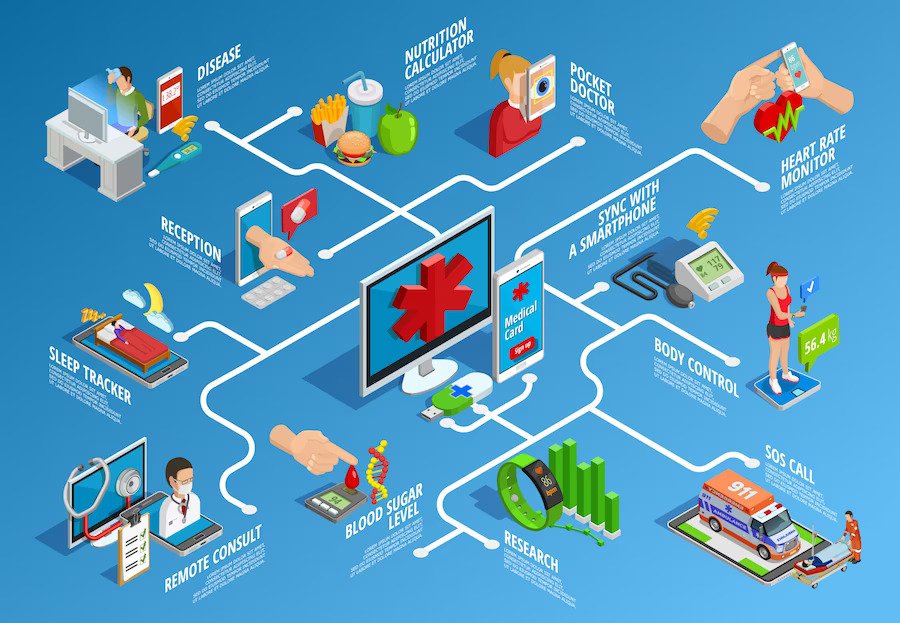How Blockchain Technology can Transform the Medical Supply Chain?
Blockchain presents a pioneering solution with the potential to transform the medical supply chain, addressing diverse challenges and offering promising outcomes. Due to its decentralized and secure nature, similar to cryptocurrencies, blockchain development services holds immense potential in revolutionizing the medical supply chain.
According to market research, the healthcare blockchain technology market had a valuation of USD 173.23 million in 2020. It is anticipated to experience remarkable growth and reach a substantial value of USD 5.61 billion by 2026, exhibiting a Compound Annual Growth Rate (CAGR) of 65.8%.
The application of blockchain in the healthcare has the ability to reshape the sharing and management of healthcare data among different stakeholders. By utilizing blockchain, the industry can enhance security, efficiency, and interoperability, resulting in improved patient outcomes and streamlined administrative processes. This transformational potential has garnered attention within the industry, and the projected growth reflects the optimism surrounding the impact of blockchain on healthcare delivery.
As the adoption of blockchain is continuously expanding, it holds the power to reshape medical data handling, creating new opportunities for collaboration and innovation within the healthcare sector.
This post will walk you through the significant transformation that blockchain technology brings to the medical supply chain, adopting its key features.
Features of Blockchain-Based Medical supply chain

Transparency
All stakeholders working in chain management in blockchain have access to the transparent feature where they can view the complete transaction history of any drug or medical device in the supply chain. This transparency helps prevent fraud, waste, and corruption, ensuring the integrity of the supply chain. It also promotes accountability and allows patients to verify the authenticity of the products they receive.
Smart contracts
Smart contracts are another essential component of the blockchain-based system. These self-executing contracts operate based on predetermined conditions and can automate specific tasks such as payments or product shipments. Smart contracts can be used to automate various processes in the medical supply chain, including verifying the legitimacy of products and ensuring agreement with legal standards.
Durability
Durability is one of the important features of the blockchain in the medical supply chain management system. This implies that the data cannot be changed once it is stored in the blockchain. This feature ensures that the data stays secure, reliable and, minimizing the risk of data breaches or manipulation.
Tracking
The tracking feature offered by blockchain technology is also crucial in the medical supply chain. As the product moves through the supply chain, its location and status are recorded on the blockchain. This tracking feature improves transparency, enabling stakeholders to have complete access to the transaction history of any medicine or medical device.
Regulations and agreements
With regulations such as the FDA’s track-and-trace standards, the blockchain-based medical supply chain ensures regulatory consent. It assists the medical industry to meet its legal duties and safeguard people from any fake pharmaceuticals and medical tools. Agreeing with regulations like the Health Insurance Portability and Accountability Act (HIPAA) and the General Data Protection Regulation (GDPR) further strengthens data protection and privacy.
Verifying patient’s data
Blockchain technology can also be used for patient verification in the medical supply chain. When a product is delivered to a patient, they can check its complete transaction history on the blockchain. This transparency increases patient safety and trust in the healthcare system by allowing them to verify the authenticity and regulatory compliance of the product they receive.
Record keeping
Record keeping is an integral part of the blockchain in the medical supply chain. The process starts by entering the product’s information on the blockchain like the manufacturer of medications or medical equipment, also including its composition, expiration date, and batch number. The other nodes on the network then validate and store this record, ensuring the security and accuracy of the data.
The Cost related to Blockchain-based software development

The cost of developing medical supply chain software incorporating blockchain technology can range from $40,000 to $200,000. This pricing depends on various factors, with the complexity of the software being used is the most important one. The software which is more complex and has more features will correspondingly be more expensive than simpler software with fewer features.
To be a part of the race in the business, it is important to recognize that it is vital to have understanding of the software with modern features that can improve the overall productivity of the medical supply chain.
Also Read- How to Successfully Implement Blockchain Into Business ?
Other factors affecting the cost to build blockchain-based medical supply chain software
- Technical tools being used and implemented
- Coding work required
- Quality assurance
- Recent Upgrades’ and Maintenance
Benefits of Blockchain in the Healthcare Sector

Greater Security:
The use of blockchain technology in the medical supply chain provides enhanced security. The records of the supply chain are made tamper-proof and secure, reducing concerns about fraud, counterfeit products, and illegal activities. With blockchain-based supply chain management, producers of medical products, distributors, and patients can have greater confidence in the authenticity and quality of medical goods.
Improved Efficiency:
Blockchain implementation in healthcare supply chain management can automate various processes such as transaction documentation, product tracking, and regulatory compliance verification. This automation improves efficiency, saving time and money in the supply chain operations.
Better Transparency:
In a medical supply chain which is based on blockchain, the partners have access to the complete transaction history of any medicine or medical device. Thus, this transparent nature reduces the possibility of fraud, increases accountability, and ensures the smooth functioning of the supply chain.
Increased Patient Safety:
The use of blockchain in healthcare management enhances patient safety by ensuring the authenticity, accuracy, and security of medical products. Patients have the authority to check the legal agreements of the products they receive, reducing the risk of fatal effects or other harm.
Improved Data Privacy:
The decentralized nature of blockchain reduces the risk of data fraud or cyberattacks as sensitive data is not stored in a single location. Encryption and other security measures further protect patient data from unauthorized access.
Enhanced Trust:
The adoption of blockchain technology in the medical supply chain promotes trust among stakeholders. The secure, transparent, and efficient blockchain supply chain management system fosters confidence among producers, distributors, regulators, and patients.
These benefits collectively contribute to improving the healthcare industry and ensure the reliable delivery of quality medical products to those in need.
The Bottom Line
A company that specializes in developing software using blockchain technology, can be a valuable partner in helping your business create efficient medical supply chain software. They have extensive technical knowledge and experience in implementing blockchain in the healthcare supply chain, which allows them to create a solution that is secure and can grow with your business.
Incorporating the best Blockchain Development services can improve transparency, traceability, and efficiency in your healthcare supply chain through blockchain development solutions. We start by thoroughly analyzing your requirements and understanding your specific business needs. Then, we create customized software that meets those needs while ensuring compliance with HIPAA regulations, which protect patient privacy and security.

















